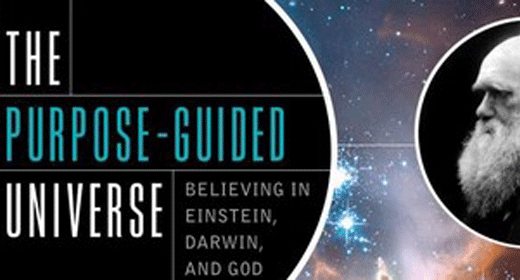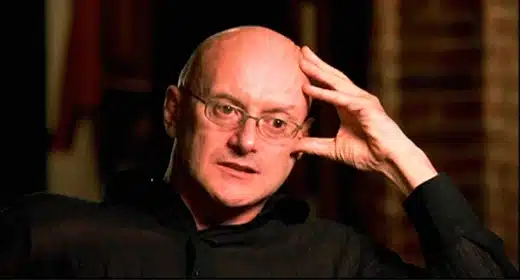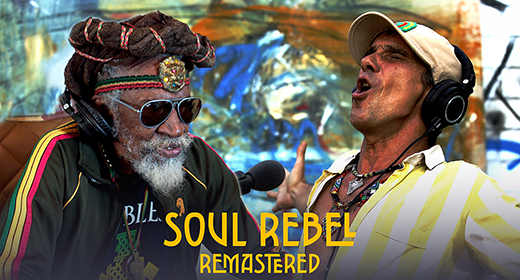Donna Quesada: By practice, you mean Zen-style meditation? Zazen?
Ken Wilber: Yes.
DONNA: So that’s the answer…
KEN: Yeah.
DONNA: Meditation into the schools… But of course, we run up against tremendous opposition.
KEN: Yes. Although, what’s so weird is that in every major religion that I’ve examined, and I’ve examined all of them in a great deal of detail, they all have mystical branches. They can be small and not very well populated, but they all have them. They all give essentially similar answers. They all talk about two selves, a relative self, and an absolute self. As Erwin Schrodinger, the founder of Quantum Mechanics… again, another reason you can get it confused… he said the overall number of consciousnesses, big consciousness, is but one. Consciousness is a singular, the plural of which is unknown.
By the way, he wasn’t a believer in quantum mechanics. He was a believer in Vedanta Hinduism. That’s where he got his big mind. But he correctly said it, the overall number of plural minds is but one, so the plural doesn’t exist.
And they all maintain that we have sort of two minds and two selves, a relative self and an absolute self, and a relative mind and an absolute mind, and they all have forms of basically meditation. And meditation is some form of mental practice that you do that will start to cut down on mental thoughts entirely, like a Zen Koan does, for example. I could just go on with sort of all of the important things that religion talks about. Religion doesn’t deliver only the mystical versions of those religions do that, and they all have them. And almost all of them died out when science arose. So, starting around 1500 CE, religions just started crashing around the world. The first that crashed were the smallest number, which were the mystics.
Unfortunately, there are just very few religions in the world today that teach enlightenment or awakening, which ought to be the only possible reason you have the slightest, slightest interest in religion or spirituality at all, is for enlightenment. I mean, Christ had it, and even St. Paul. I mean, he was aware of it. A lot of the early Christians, of course, had these oneness experiences. St. Paul says, “Let this consciousness be in you, which was in Christ Jesus, that we all may be one.” That’s a perfect description of an enlightened state of awareness, and St. Paul knew about it.
DONNA: I’m sorry for interrupting… through your book, I became interested in Bishop John Shelby Spong, who you also mentioned.
KEN: Oh, yeah.
DONNA: I was just so delighted when I read about him, acknowledging as valid, homosexual marriage and embracing the mystical experience of unity. I had the thought… maybe you can comment on this… perhaps that’s where the answer lies, not in saying religion is bad and a waste of time, but in bringing forth that change from within the source.
KEN: Yeah. Well, exactly. That’s what I mean by religion is wasted because it doesn’t usually give you ways to transfer from a religious belief to a spiritual experience. And because that’s become so rare, I’ve become very upset with the typical form of religion in the world. By the way, Bishop Shelby Spong is a good friend of mine, and I just love the guy.
DONNA: Well, I can’t wait to order his books based on what I read in your book.
KEN: That’s great.
DONNA: I know our time is, is winding down, but in preparation for our next interview where we’ll go into a deeper dive, into the stages of growing up, could you just leave us with a little teaser and maybe give us an elevator summary version of those stages of growing up? What I love about them, and correct me if I’m wrong, is that they take you from that egocentric “I” to the “we.”
KEN: Right. And from the we to all we’s.
DONNA: Hmm.
KEN: By the way, the stages of growing up, which I call the process of just growing up, is very different from the stagesof waking up, which I just call waking up. You can be very high on one and low on the other, or vice versa, or any combination. There are three other processes that go through evolution, which I call opening up, cleaning up, and showing up, and we can talk about those later when we talk about growing up and sleep.
DONNA: Showing up.
KEN: Yeah. Waking up, because it is a first-person direct experiential awareness, we discovered that almost the day we emerged as a separate species, which anthropologists put that upwards of 400,000 years ago… And because, like I say, if you have a direct awakening experience, you know… You’re perfectly aware of it. You can’t miss it. You’ll tell everybody you meet that you have it…
DONNA: And nobody can deny it. Nobody can tell you you didn’t. It would be like saying, “No, you don’t have a headache.”
KEN: That’s right.
DONNA: It’s my experience.
KEN: That’s right. So, that’s a waking-up experience. Growing up experience, you have no interior awareness of the stages you’re at, at all, unless you actually study a developmental psychology text, learn all the stages, and then sort of introspect and figure out… sort of blindly punch through to what stage you’re at now.
And you can do that. I mean, they do have characteristics and you can spot them in yourself, but if you just look within, well, they’re very like grammar. Right now, you and I are following an immensely complicated set or system of grammar rules, but we can’t look within and tell you what those rules are. We’re not aware of them because they’re not first-person experiences. They’re aren’t something that a mind can be attached to. The last time we probably learned these grammar rules is… if and when we were taught grammar in grammar school. Sometimes in the third or fourth grade, you’ll start to learn some of these grammar rules and they have you write them out. And then by the time you’re out of that grade, you’ve completely forgotten what they are.
DONNA: It’s internal.
KEN: Yeah. So that’s what stages of growing up are all like! Grammar. They each have a different kind of grammar operating in them, but you can’t know that.
DONNA: It informs the way we make sense of our experience. Would that be true? It informs, it gives us the wherewithal to make sense of our experience, and shapes the way that we will interpret it. Would that be correct?
KEN: Well, that’s definitely what the grammar does. It’s the foundation of each worldview that we have. A worldview does shape everything about what we see and how we see it, what we want, what we desire, what motivates us, and all of that. So the first worldview stage is called the Archaic Stage, and it’s called “archaic” because we share a lot of animal characteristics that come from this archaic stage… because that stage is a stage evolutionarily, where we were moving from our fusion with lower animals to our emergence as Homosapiens, as a real human being with a real brain and real thought processes, and so on. As I say, most anthropologists, they used to put it at 300,000 years, but then somebody in Africa, of course, found a new skeleton of a woman that was 400,000 years old, but she was clearly a Homosapien.
So, we’ve been on this planet for 400,000 years. If we did come into existence 400,000 years ago, probably within the first hundred thousand years. So from 400,000 to 300,000 BC, we were at an archaic stage. We were still largely fused with chimpanzees, gorillas, and so on. And then starting around 300,000 and peaking at around 50,000, we developed through a Magic Stage. This is a stage we all went through. If we were in a tribe, the whole tribe was in this magic stage. That’s when, for our culture, we had, basically, sacrifices. Those included human sacrifice or animal sacrifice, or sometimes just a pear sacrifice or an apple sacrifice, just something that was living and that had some sort of life force and that you could offer with gratitude to one of the gods that you were just starting to form.
They would come into real prominence at the next stage, the Mythic Stage. But at this stage, you were still sort of practicing voodoo-like religion. You’re stabbing dolls all the time that look like your enemies and that kind of thing. But that did have some real human qualities. We were learning to speak. Towards the latter part of magic, particularly the beginning of mythic, we were learning how to write. Well, the reason we moved into mythic is that the form of the self that we had during the magic stage was called, again, egocentric, because we were still very absorbed as our own small self, our own ego, and that ego was one with the mind that couldn’t differentiate itself well from the environment around it. It didn’t know it had no head, although it didn’t, but it didn’t know that.
So, it’s a basic form of religion… of some sort of voodoo practice or something that’s similar to that. As we started to grow, as our minds started to differentiate itself from the world, then we started to lose our capacity for management because we’re no longer one with the world.
Therefore, stabbing the doll was just stabbing a doll. It wasn’t stabbing the real person because we could tell the difference. So, we started to create a mythic worldview. The mythic, or mythic literal, as the term mythic literal implies, is a world that was full of divine gods and goddesses and divine nature spirits, and so on. All of those, we took what magic we had left, and we gave it to all of these gods and goddesses, so that we started to produce a mythic stage of development. This we know mostly from the early Greeks, who had all sorts of myths.
Most of the myths we know and most of the gods and goddesses have Greek names, Apollos, Aphrodite, Venus, Lares, and so on. These gods and goddesses and nature spirits, they’re all alive, so they want what we want. We think they want what we want, which is some sort of life force to keep them going. We came up with sacrifices that we could offer to these gods and goddesses. And if we did that, since they can perform magic, we can ask in return that they perform some magic fit for us, like, making the crops grow or making the rain stop or some sort of thing like that. I often nowadays say, to help you get the girl or help you get the guy, or help you get a new car, although none of those are really thought of back then.
DONNA: We moved from archaic to magic to mythic, where we give the magic over to the gods.
Ken: That’s right. So, this is where the core of the world’s great religions came into being. First of all, because they’re dealing with supernatural spiritual entities, or so they think, they have a mythic literal mentality. And because they would do sacrifice, sacrifice became the core of the rituals that we would do to ensure our bond between us and the God or goddess that we had chosen. I mentioned before, the Mayas, all Central American forms of culture… they each had a religion that sacrifice played the core part of that religion. For both of them, the sacrifice was of living human beings. You’ve seen the great pyramids that the Aztec minds created.
DONNA: I’ve seen them.
Ken: They all have a slide of steps going from the bottom all the way up to the top. They would walk the sacrificial victim up to the top, tie him down on a pedestal, and then the priest would take a knife and cut into his chest and he pulled his heart out while it’s still beating. He would usually eat the heart, and they would push the dead body down the flight of steps, and it would bounce all the way down to the bottom where all the townspeople that had been watching the sacrifice would scoop it up, take it home, and boil it and eat it. That was the beginning of religion. Not a very pretty story.
It’s lived up to its various good or bad qualities during its history. Even some anthropologists have claimed that it’s the single greatest source of torture, murder, and mayhem in all of human history. A few anthropologists have pointed out that actually more Mayhem was caused by 20th-century totalitarian regimes: Hitler, Stalin, Mao Zedong.
Hitler killed at least 13 million people, 7 million intellectuals, gays, gypsies, and so on, and 6 million Jews. So that was 13 million. But Stalin killed anywhere between 80 and 100 million people. What does it mean to murder one million people? That’s a third of the population of the United States. And Mao Zedong the same, 80 to 100 million. So, that might give religion a run for its money. But it did start as basically sacrificial to mythic literal gods and goddesses.
DONNA: But continuing to climb through the stages, where do we go from there?
Ken: What began to happen, and it actually took a fairly long time, is around 1605. Two men, Galileo and Johannes Kepler simultaneously and independently invented modern science because they both came up with an almost identical quote in their writings. They said, “The laws of nature are to best be understood through measurement,” and of course, logic and reason, and all of that sort of went without saying, but the measurement was the real key to the founding of modern science.
So Kepler, for example, actually measured the motion of planets. He came up with the laws of planetary motion, which among other things, showed that the sun doesn’t circle the earth and the earth doesn’t circle the sun. The earth rotates around the sun and in the form of an ellipse, which is a sort of squished circle.
Galileo himself measured terrestrial motion and came up with his laws of earthly motion. And then the super genius Isaac Newton, about a hundred years later, put both of them together. Isaac Newton when he had this insight… he’s always depicted as sitting under an apple tree and an apple falls on his head. Well, the reason they do that is that his great insight was that the same force that makes the moon circle the earth, makes the apple fall from the tree, namely gravity. So, he came up with his laws of universal gravitation, which unified the entire universe.
It was with the emergence of that kind of thinking that the formal operational cognition or reason or the move beyond concrete operational thinking, which is thought operating on the world to formal operational thinking… which starts operating on thought… And that gives you laws, mathematical laws, and so on, which Kepler and Galileo and Newton all came up with.
Those mark the official founding of modern physics, modern astronomy, modern geology, and so on. That created the continuing battle between science and religion. That’s always been an enormously irritating battle for me because I believe, and the evidence strongly supports this… that there are at least two major forms of spirituality or religion.
There’s religion of the mythic literal type, and there’s the spirituality of the Zen Buddhist awakening, enlightenment version. Science has a right to pick on mythic literal childish thinking, but it doesn’t have a right to pick on mystical religion. That’s why the founder of quantum mechanics… the real founder of quantum mechanics, Schrödinger, said that the overall number of minds is but ONE. Consciousness is a singular, the plural of which is unknown. He himself, was a follower of Vedanta Hinduism. Vedanta is the section of Hinduism which is an enormously huge… some hundred religions. But the one subsect of Hinduism that is purely mystical is Vedanta.
DONNA: Embraces non-duality.
Ken: Exactly.
Purchase Finding Radical Wholeness Here.
Read and Watch 2nd Ken Wilber Interview Pt 1 Here: 2nd Ken Wilber Interview Pt 1 – A Spiritual Experience Is A Direct First-Person Experiential Awareness
Read and Watch 2nd Ken Wilber Interview pt 2 Here: 2nd Ken Wilber Interview Pt 2 – Moving Beyond Mythic Religion
Read and Watch 2nd Ken Wilber Interview Pt 3 Here : 2nd Ken Wilber Interview Pt 3 – What Good Is Awakening?
Read and Watch 2nd Ken Wilber Interview Pt 5 Here: 2nd Interview withKen Wilber Pt 5 – The Importance of the Stages of Development
Source: AWAKEN
Here is a link to our first interview with Ken Wilber: Read and Watch Pt 1 Here: Awaken Interviews Ken Wilber Pt 1– Every Sentient Being Including a Dog, Has a Buddha Nature










































